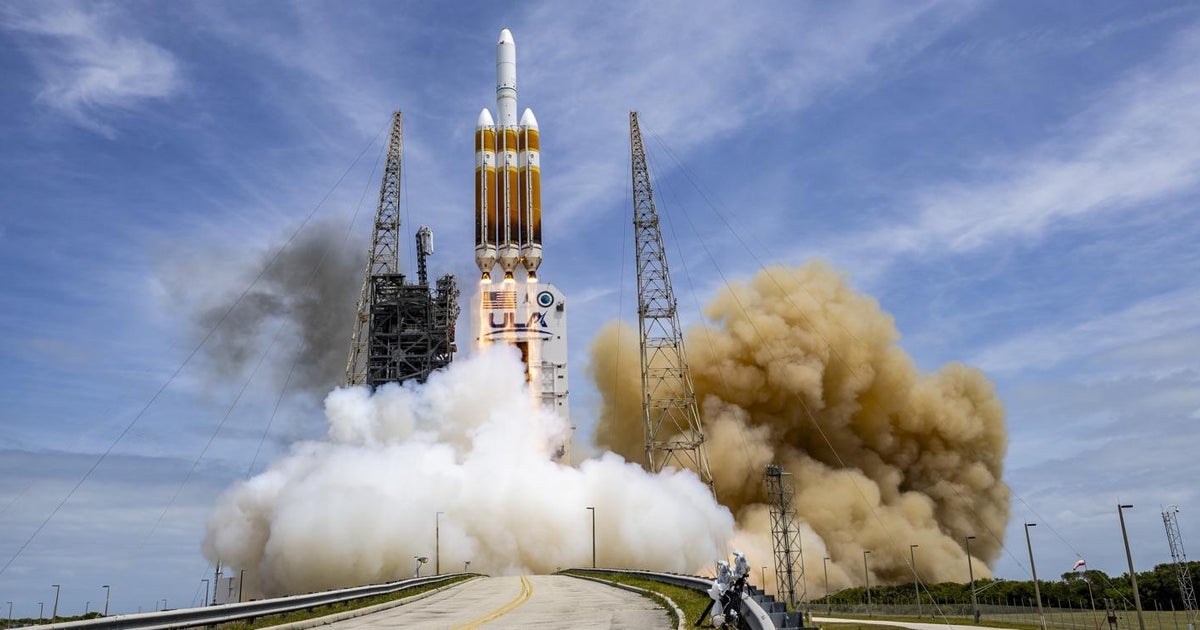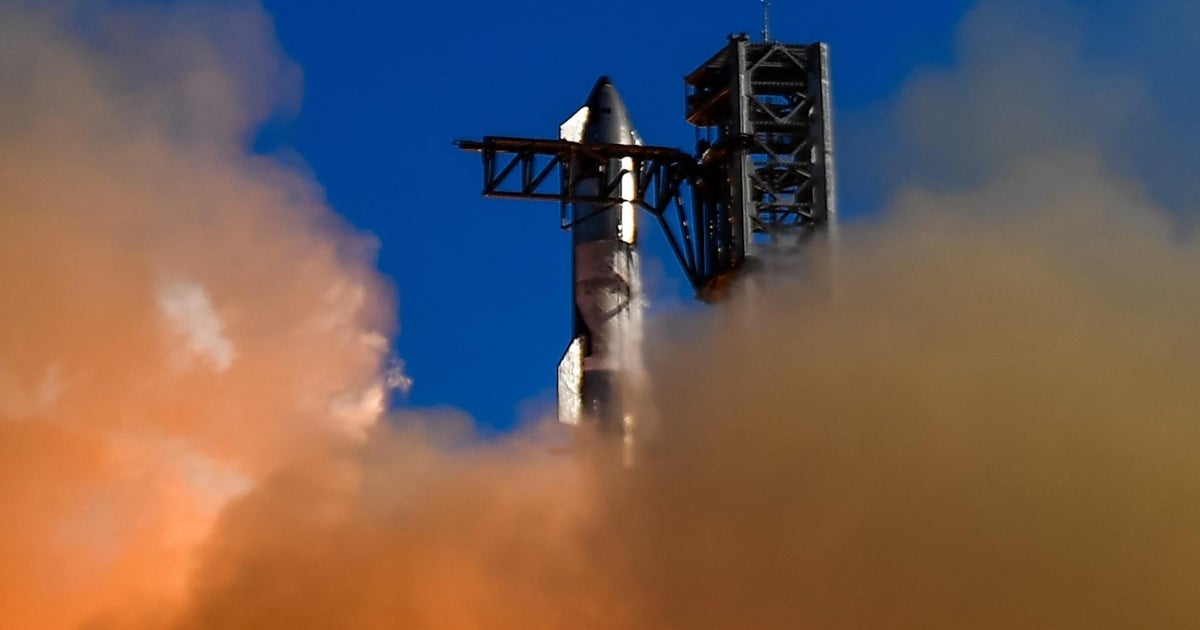CBS News
Ending an era, final Delta 4 Heavy boosts classified spy satellite into orbit

Ending an era in U.S. rocketry, United Launch Alliance fired off its 16th and final triple-core Delta 4 Heavy Tuesday, launching a classified spy satellite in the last hurrah of a storied family of rockets dating back to the dawn of the space age.
The Heavy’s three hydrogen-fueled RS-68A first stage engines ignited with a rush of bright orange flame at 12:53 p.m. EDT, smoothly pushing the 235-foot-tall rocket away from pad 37 at the Cape Canaveral Space Force Station in Florida.
United Launch Alliance
The launch came 12 days late, primarily because of work to replace a pump in a system that supplies nitrogen gas to multiple launch pads from a pipeline running through the Kennedy Space Center and the Cape Canaveral Space Force Station. There were no problems Tuesday.
Mounted atop the rocket was a classified satellite provided by the National Reconnaissance Office, the secretive government agency that manages the nation’s fleet of sophisticated optical and radar imaging reconnaissance satellites and electronic eavesdropping stations.
In keeping with standard NRO-U.S. Space Force policy for such missions, no details about the NROL-70 payload were released. But about six hours after launch, the National Reconnaissance Office declared the launch a success, indicating the satellite reached its planned orbit.
“All of our missions are really important, and this one ranks up there,” NRO Director Chris Scolese told reporters before the rocket’s initial launch attempt. “But it’s a little bit more special because it is going to be the last flight of the Delta 4 Heavy.
“As with all of our missions, they’re focused on national security and delivering the best information, we believe, in the world for our policy makers, the warfighter and the civil community.”
Based on the Heavy’s easterly trajectory, safety notices and other factors, independent analysts concluded the payload most likely was an advanced signals intelligence satellite bound for a geosynchronous orbit 22,300 miles above the equator.
Satellites at that altitude appear stationary in the sky as they orbit in lockstep with Earth’s rotation, allowing continuous observations of specific regions.
Such signals intelligence satellites are believed to feature giant mesh antennas that unfold in space, acting as “huge … ‘ears’ in the sky, monitoring large areas for radio emissions, notably military (communications),” according to Marco Langbroek, an independent analyst based in the Netherlands.
Asked specifically about the nature of the NROL-70 satellite, Scolese told reporters “there really isn’t much that I can say other than it’s a national security payload that’s going to provide exquisite capability that is needed by a lot of people and organizations, clearly the policy makers, the warfighter and others so that they can know what’s going on.”
In any case, as is standard practice for classified missions, ULA ended its launch coverage with confirmation of second stage engine ignition and payload fairing separation seven minutes after liftoff. The rest of the ascent was carried out in secrecy.
The final appearance of a Delta rocket 63 years after the first variant’s maiden flight was an emotional milestone for the managers, engineers and technicians who assembled and launched the last member of the family.
“Launching the last Delta 4 is bittersweet for me,” Col. Eric Zarybnisky, director of NRO’s Office of Space Launch, said in a statement. “I was part of the team that launched the first Delta 4 for the NRO. Since that time, the Delta 4 has put amazing capability on orbit for this nation.”
Tory Bruno, president and CEO of United Launch Alliance, also called the flight a “bittersweet” moment as the company continues its transition to next-generation Vulcan rockets, phasing out its more expensive Delta and Atlas families.
“Soon, Vulcan will pick up that mantle and we’re going to retire this venerable rocket that has made so much important work for our country,” he said after launch in a pre-recorded video.
“I want to thank everyone who has been involved with the Delta 4 Heavy. We have many employees who were here for the very first Delta 4 launch who are still here now for the last Delta 4 launch to send off this great vehicle into its well-earned retirement.”
He told reporters earlier that closing out the Delta line “is obviously the future, moving to Vulcan, a less-expensive, higher-performance rocket. But still sad.”
The single-core Delta 4 and triple-core Heavy were expensive, with some versions of the Heavy reportedly selling for more than $300 million each. While capable of putting high-priority military payloads into complex, hard to reach orbits, the program wasn’t considered sustainable in an era of smaller, more numerous satellites and lower-cost boosters from SpaceX.
The Delta family of stages and rockets had its roots in the early space program, first serving in the nation’s fleet of intermediate-range ballistic missiles and evolving through multiple versions used to put military, NASA and civilian payloads into orbit.
The now-retired Delta 2 debuted in 1990, putting the first Global Positioning System satellites into orbit and sending multiple planetary probes into deep space, including Messenger to Mercury, multiple Mars orbiters, the Pathfinder, Spirit and Opportunity Mars rovers, the Spitzer Space Telescope and many more.
The single-core Delta 4 first flew in 2002 with the first Heavy following two years later. The single-core version flew the program’s final flight in 2019. Tuesday’s launch was the 45th flight of a Delta 4 and the 16th and final Delta 4 Heavy.
“We’re very excited to come in with Vulcan and fly these missions, but at the same time, we love this rocket,” Bruno said of the Delta family.
“Delta has been around in one form or another for 60 years,” he added. “It just has a storied legacy, and it has done great things for our nation. We’re very proud to have been a part of that, and even though Vulcan is the future, I’m personally sad to see it go.”
CBS News
CBS News rides along with Texas sergeant at U.S.-Mexico border

Watch CBS News
Be the first to know
Get browser notifications for breaking news, live events, and exclusive reporting.
CBS News
Canada’s Trudeau faces calls to resign amid Trump tariff threat

Watch CBS News
Be the first to know
Get browser notifications for breaking news, live events, and exclusive reporting.
CBS News
Supreme Court to decide on TikTok’s future in the U.S.

Watch CBS News
Be the first to know
Get browser notifications for breaking news, live events, and exclusive reporting.









